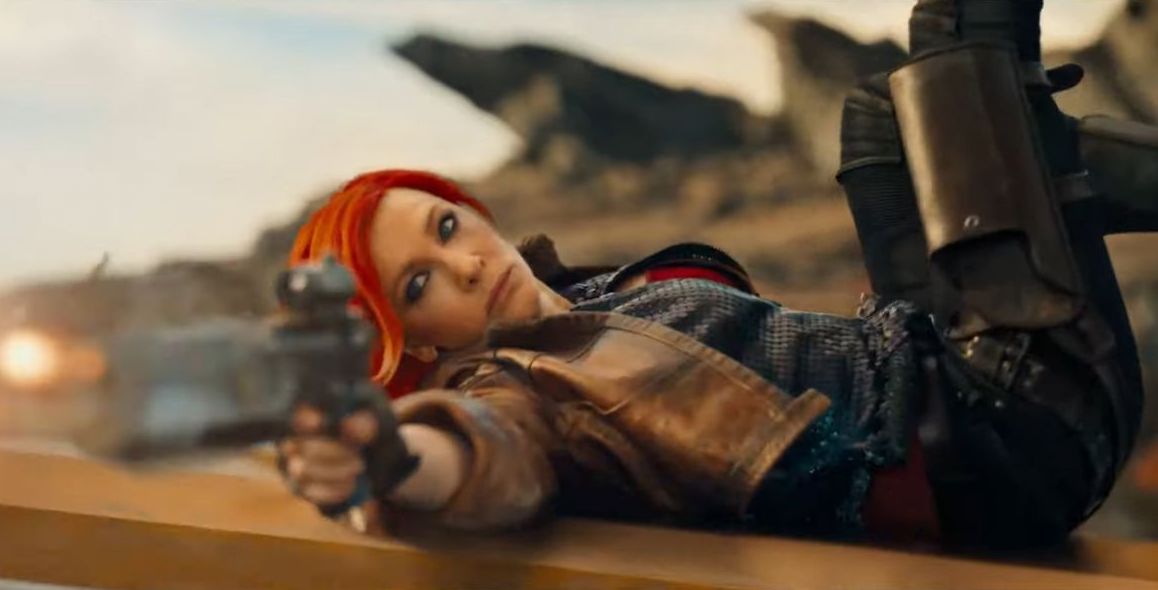 ★★★
★★★
“Guardians of the Wasteland”
Reading all the vitriol that has been poured over this movie feels a bit like history repeating for me. I recently saw the same reaction to Madame Web and it was just as unjustified as here. What never ceases to astonish me, is how extreme critical assessments are nowadays: reviews seem to be without any kind of balancing the good and the bad. Every movie has its qualities and its weaknesses. I recently saw Alien: Romulus which I found to be pretty good but not without flaws, and many critics were able to see both aspects. Not so with Borderlands. While I wouldn’t call the film really good entertainment, the universal mauling it is receiving is undeserved. I’ve seen so much worse in my life – movies that hardly had any real plot or entertainment value – that in a way I feel I’ve got in a way to protect Borderlands from the unfair, over-the-top criticism. More about that later.
In a not deeply explained Science Fiction scenario. bounty hunter Lilith (Blanchett) is convinced to rescue the daughter of uber-nasty Atlas (Ramirez), Tiny Tina (Ariana Goldblatt), who had been abducted from a prison by soldier turned mercenary Roland (Hart). Atlas doesn’t care for his scientifically-created daughter at all, but Tiny Tina is believed to be the key to a secret cave containing some kind of “treasure” he may use for evil. The rescue party is joined by muscle-bound guardian Krieg (Florian Monteanu), the robot Claptrap (voiced by Jack Black) and weird scientist Tannis (Jamie Lee Curtis), who go on the search pursued by Atlas’ henchwoman Commander Knoxx (Janina Gavankar).
Let’s be clear about one thing: “Borderlands” is not really a good movie, and I will go into more detail on its many flaws shortly. But it also never pretends to be a serious SciFi epic: maybe this was exactly what “broke” it? I was oddly reminded of Tank Girl (1995), a movie that also toned down its spicier template and came along with some failed attempts of humor. On its original release, Tank Girl was also critically reviled, but has since managed to garner a small cult following. I wouldn’t be astonished if that could end up as the future fate of Borderlands, too, despite its many problems. Where to begin? Probably with the main lead. When the news came out that Cate Blanchett was cast as Lilith, fans of the video game on which Borderlands is based were in uproar. She was seen as too old to play the role, and the same went for Curtis, who is now in her sixties.
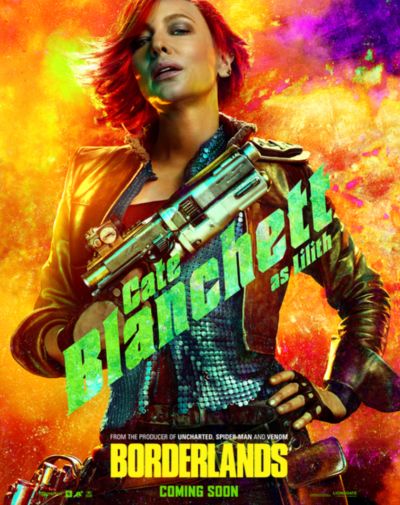 While that may have bothered the gamers, I had no problem with it at all. Admittedly, I have never played the games, so what do I know? But Cate Blanchett, who is in her mid-fifties, still looks fit and beautiful enough to play an action role – which is, at least for me, something I always wanted to see. I was quite disappointed when her villainous Hela in Thor: Ragnarok (2017) was side-lined in favor of Thor and Hulk battling it out on another planet. Her red hair here, incidentally reminded me of old dystopian SF movie Cherry 2000. Fans will always complain about how their heroes are portrayed. It’s an old story: Hugh Jackman was too large for Wolverine, Tom Cruise too small for Jack Reacher, I tend to file these under “Bond is not blond”: I don’t think these complaints should matter much, if the respective actor can fill out the role in question believably.
While that may have bothered the gamers, I had no problem with it at all. Admittedly, I have never played the games, so what do I know? But Cate Blanchett, who is in her mid-fifties, still looks fit and beautiful enough to play an action role – which is, at least for me, something I always wanted to see. I was quite disappointed when her villainous Hela in Thor: Ragnarok (2017) was side-lined in favor of Thor and Hulk battling it out on another planet. Her red hair here, incidentally reminded me of old dystopian SF movie Cherry 2000. Fans will always complain about how their heroes are portrayed. It’s an old story: Hugh Jackman was too large for Wolverine, Tom Cruise too small for Jack Reacher, I tend to file these under “Bond is not blond”: I don’t think these complaints should matter much, if the respective actor can fill out the role in question believably.
That said, maybe this kind of role isn’t really made for Blanchett, who comes across awkwardly as a female trigger-happy bounty hunter – it isn’t her age. It feels as if director Eli Roth may have told her to get into character as a strong, independent, tomboy, action heroine and walk around like John Wayne, always with one hip hanging below the other. It becomes quite distracting after a while, and you feel it is indeed just an outward pose, not stemming from inside. In other words, you feel Blanchett is pretending to be a tough woman, not really “being” her. It’s odd, given she is such an accomplished actress. Considering she received an Oscar nomination for her next movie Tár, (Borderlands was produced during the COVID era and held back a couple of years, which didn’t help opinion), I blame it on Roth’s failure to guide his actors.
Complaints were also directed at how the movie toned down the level of graphic gore and violence the games depicted, becoming a very “tame” affair. Indeed, one of the reasons the movie was delayed was the studio executives deciding, upon seeing Roth’s cut of the movie, that they had to re-work the movie. While this seems to have become almost standard in modern Hollywood (Marvel movies, anyone?), it is never a good sign in my opinion. If a movie script and style was agreed on before production – which you would expect to be the logical order- there should be no need to re-film scenes or film new ones. Yet this is exactly what happened with here, with the director for these new scenes being Tim Miller of Terminator: Dark Fate. So, essentially, it’s difficult to say to what degree the movie in cinemas is the movie Roth originally directed.
No one wants to be connected with an expensive flop. Original writer Craig Mazin (The Last of Us) had his name removed from the film’s credits, claiming he didn’t write the movie. Under Miller, a new screenwriter was brought in, and again, it’s difficult to say who is responsible for what. There’s an old proverb: “Too many cooks spoil the broth”. It seems to be exactly what happened here. You can’t really blame the studio for wanting to get the teenage audience. When I watched it on the day of release in my local cinema, six of the eight people in the audience were teens, plus me and a father accompanying his two sons. This seems to be aimed at the Guardians of the Galaxy audience, movies which have made a lot of money over the years.
But when you do a movie based on something, you could hardly make a bigger mistake than ignoring the wishes of the fan-base. Look where the Star Wars franchise stands now. You need to respect the template, otherwise the fans who made it successful in the first place, will be against you. It’s a lesson to be learned here. That said… the movie has other problems. It feels very fragmented, the characters going from one place to the next like… well… in a video game, daah! It never creates a feeling of any real palpable threat or danger, and if the heroes don’t feel concerned about their own fate, why should the audience? But for that, the characters have to be developed in the first place, since we are expected to invest time into them, right?
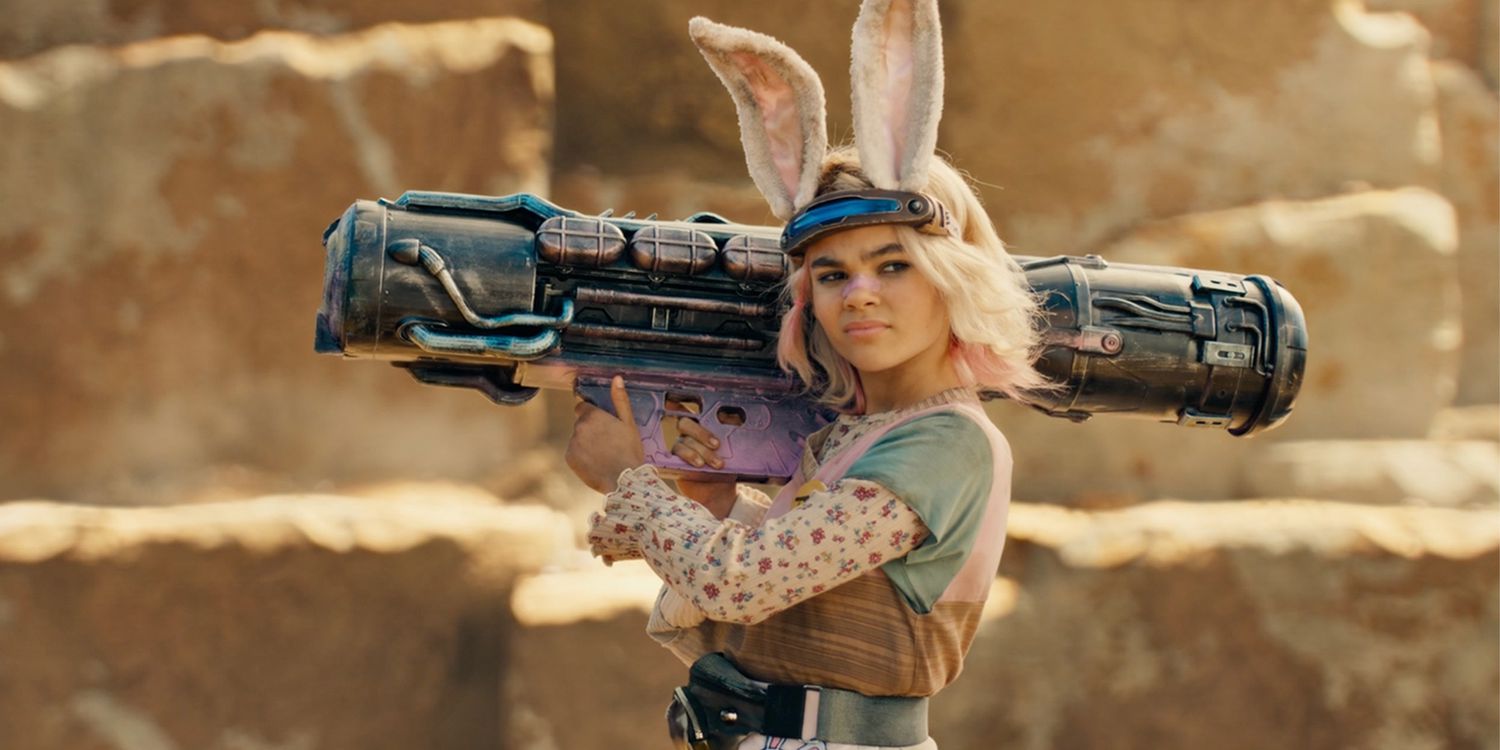 Instead, most of the time, these characters feel like cardboard cut-outs. Apart from Lilith no one gets any kind of backstory. There are one or two nuggets about Tiny Tina, Claptrap or Tannis and that’s it. It’s even worse with the male characters, I know literally nothing about Krieg or Roland. Who are they supposed to be? Where do they come from? Don’t get me wrong, I hardly need an extensive biography: a bit more than nothing would have been nice. Also, who are these different groups? What do they stand for? Why are they fighting? Against whom? It feels as if the filmmakers expect me to know all this before I go into the movie.
Instead, most of the time, these characters feel like cardboard cut-outs. Apart from Lilith no one gets any kind of backstory. There are one or two nuggets about Tiny Tina, Claptrap or Tannis and that’s it. It’s even worse with the male characters, I know literally nothing about Krieg or Roland. Who are they supposed to be? Where do they come from? Don’t get me wrong, I hardly need an extensive biography: a bit more than nothing would have been nice. Also, who are these different groups? What do they stand for? Why are they fighting? Against whom? It feels as if the filmmakers expect me to know all this before I go into the movie.
Well, does at least the humour work? I mean, it’s supposed to be some kind of SF slash Action slash Comedy, right?
Oh, boy. Another German figure of speech is, “Humour is when you laugh anyway”. That’s true: but this movie showers you in bad jokes and stupid “Look how hip my lingo is” phrases, and I laughed exactly twice in the entire movie. Most of these “wanna-be-hip-and-cool” lines fall absolutely flat. They are also fired at you so fast, as if someone was afraid the audience would get bored if a second was left before the answers, that you can hardly digest them. It’s like a stand-up comedian delivering punchlines without giving the audience time to “get it”, instead immediately rushing on to the next joke. As a result, even something that could be funny falls flat. That’s how the humor here is handled most of the time.
Unfortunately, the same is true for important story details. Essential facts and plot-points are thrown away in casual info dumps, so most of the time you hardly understand what is happening and why. Take, for example, Cate Blanchett arriving at her starting point. She gives you a summary in voice-over about what just happened in thirty seconds, and obviously one or more scenes were cut out, including an action scene. I can’t blame an audience for being bewildered and switching off here. Other strange script decisions pop up in the film on multiple occasions. For instance, when the adventurers escape in a quickly moving elevator, they are tossed out high in the air. They all land intact and unhurt, because Tiny Tina used teleportation skills she just discovered that very moment, and were never mentioned previously. Then she doesn’t use them in the finale, when they would have helped.
Or there’s the finale when it is revealed the key to the chamber isn’t who we expected. It seems that everyone, including the movie, wasted our time with that little brat! But that aside, the revelation, which should have been a big surprise, has no impact because we were never told what to expect when our gang reach their destination. No momentum was built towards the twist, and as a result, there is also no feeling of an earned pay-off. Things like poorly thought-out writing and direction that doesn’t give the characters… well, character, as well as the haphazard line delivery grind the movie down continuously. I can actually empathize with people rejecting this in its entirety. At the same time, to employ one last German figure of speech for today: “Leave the church in the village!”, meaning don’t exaggerate.
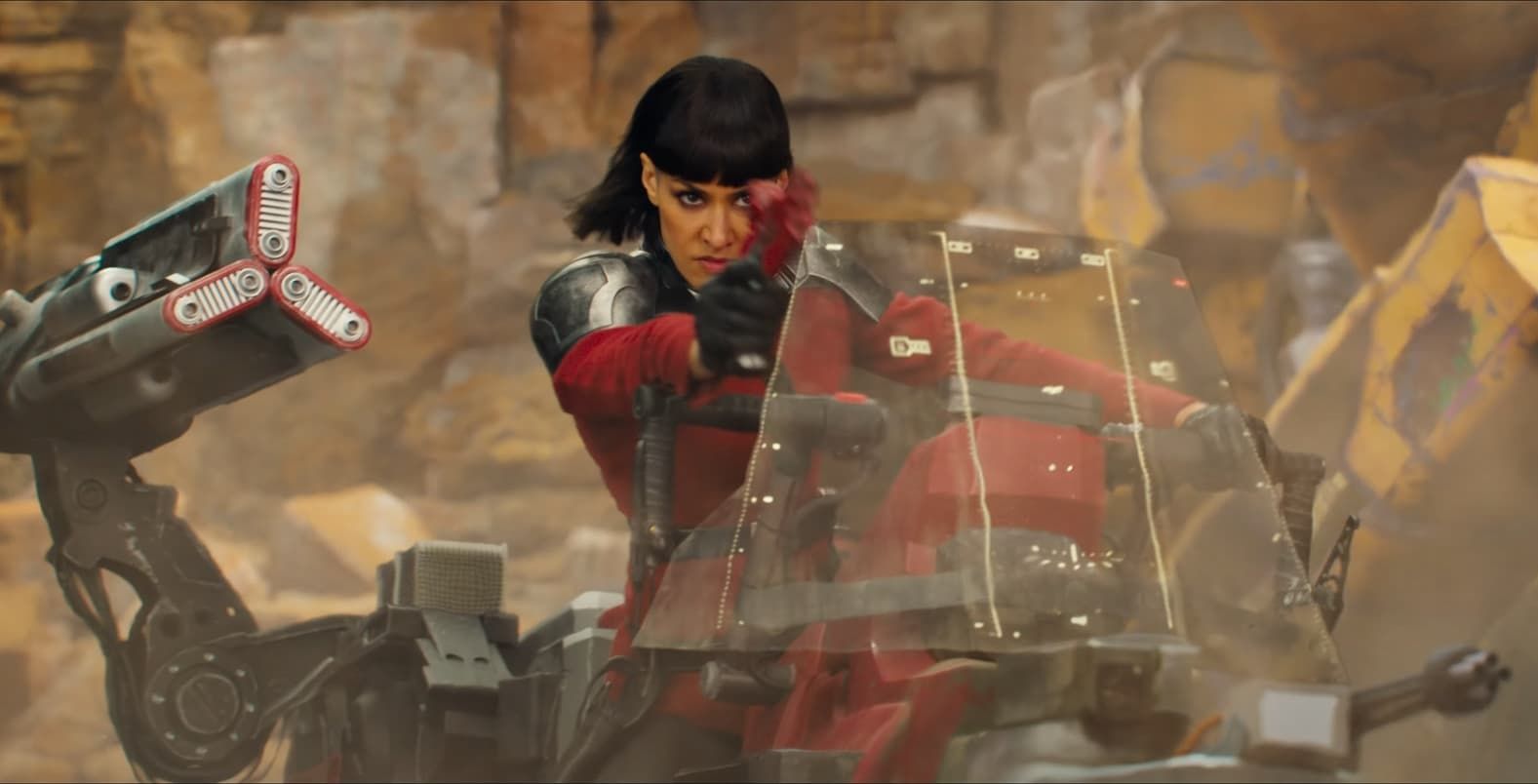 For, yes: Borderlands disappoints, whether or not you know the games. A simple comparison with James Gunn’s Guardians of the Galaxy movies or his second Suicide Squad shows you that so much more and better could have been possible. Instead of a good movie you get, as with Madame Web recently, a fairly mediocre one. But again: “fairly mediocre” is not the same as “utterly terrible”. That popular interest in action heroines seems to have largely evaporated, for a range of reasons, may be an additional factor in the clear financial failure of the movie. But I guess those in charge expected it would happen, going by the lack of marketing worth mentioning. Just compare the few interviews available online for this movie, with the huge marketing campaign that was launched for Deadpool & Wolverine.
For, yes: Borderlands disappoints, whether or not you know the games. A simple comparison with James Gunn’s Guardians of the Galaxy movies or his second Suicide Squad shows you that so much more and better could have been possible. Instead of a good movie you get, as with Madame Web recently, a fairly mediocre one. But again: “fairly mediocre” is not the same as “utterly terrible”. That popular interest in action heroines seems to have largely evaporated, for a range of reasons, may be an additional factor in the clear financial failure of the movie. But I guess those in charge expected it would happen, going by the lack of marketing worth mentioning. Just compare the few interviews available online for this movie, with the huge marketing campaign that was launched for Deadpool & Wolverine.
So, what is good in this movie? Well, I like the production design, which is very nicely done. The colourful, outlandish costumes made me smile. The special effects are of a decent standard – no less, no more. I enjoyed the over-the-top action scenes. It was nice to see Gina Gershon again: long time, no see. The choice of songs seemed adequate, though they mostly pop up suddenly without reason. Most of the actors do good work, it’s not their fault the writing and directing failed them. I still like Hart, and think Goldblatt gives a very good performance, although I couldn’t stand her annoying “little brat” character. Curtis, while not having much to do, is still a pro. Only the strange stance and walk of Blanchett constantly derails what she is supposed to portray here. Both she and the hardly threatening Ramirez feel miscast.
Overall, you can enjoy the movie if you keep your expectations low. Very low. Still, this doesn’t make it the worst movie ever, maybe not even the worst of 2024. There are so many smaller, terrible movies no-one ever talks about. Everyone is always focused on the wannabe blockbuster releases, and so, here we are. I would still like to see Blanchett as a convincing action heroine in a better movie. Maybe she will be more successful in the upcoming Alpha Gang where she plays the leader of a gang of aliens who disguise themselves as 1950s bikers to invade the earth. All we can do is hope for the best.
Dir: Eli Roth
Star: Cate Blanchett, Kevin Hart, Jack Black, Edgar Ramírez





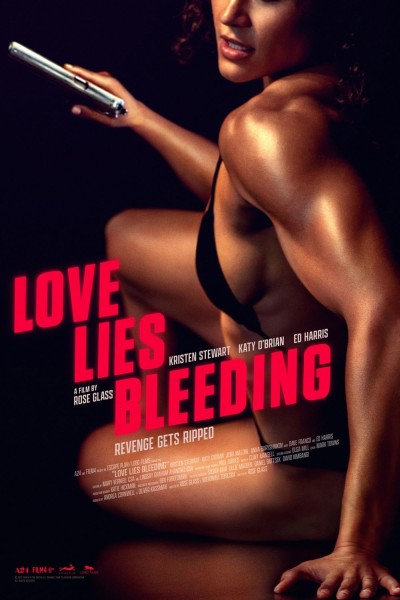 It’s all a very grubby take on the lesbian-noir genre, whose best-known example is probably Bound. Stewart seems consciously to be trying to break out of her Twilight reputation, though results so far have been mixed. At least this isn’t the
It’s all a very grubby take on the lesbian-noir genre, whose best-known example is probably Bound. Stewart seems consciously to be trying to break out of her Twilight reputation, though results so far have been mixed. At least this isn’t the 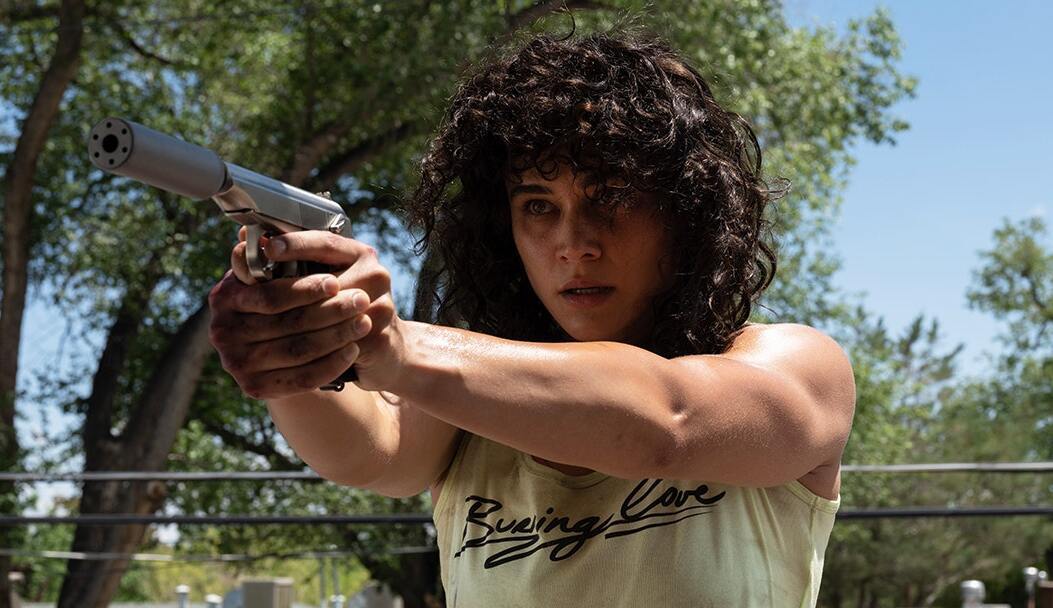 Glass doesn’t shy away from the ugly or disgusting. One of the first scenes show us Stewart cleaning a clogged toilet (remember the scandal when Hitchcock showed us a
Glass doesn’t shy away from the ugly or disgusting. One of the first scenes show us Stewart cleaning a clogged toilet (remember the scandal when Hitchcock showed us a 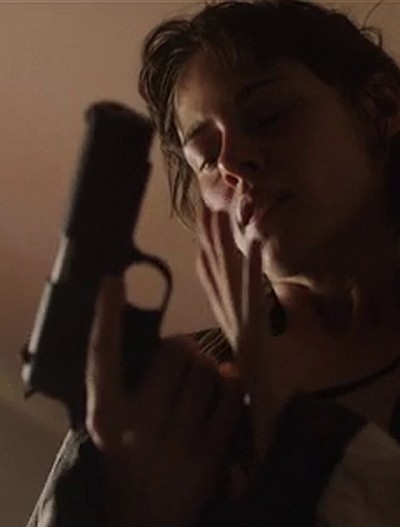 In classic Hollywood noirs, dark-hearted anti-heroes would pay for their crimes. Among many examples, Fred MacMurray getting shot for his sins by femme fatale Barbara Stanwyck in Billy Wilder’s classic Double Indemnity (1944). Heck, even Thelma and Louise paid with their lives for a more or less accidental killing. In modern films it seems if evil is done by women, film makers are reluctant to give them the punishment they deserve, and let them off the hook. I find such story-telling hypocritical and highly questionable: what message is being sent to an audience?
In classic Hollywood noirs, dark-hearted anti-heroes would pay for their crimes. Among many examples, Fred MacMurray getting shot for his sins by femme fatale Barbara Stanwyck in Billy Wilder’s classic Double Indemnity (1944). Heck, even Thelma and Louise paid with their lives for a more or less accidental killing. In modern films it seems if evil is done by women, film makers are reluctant to give them the punishment they deserve, and let them off the hook. I find such story-telling hypocritical and highly questionable: what message is being sent to an audience?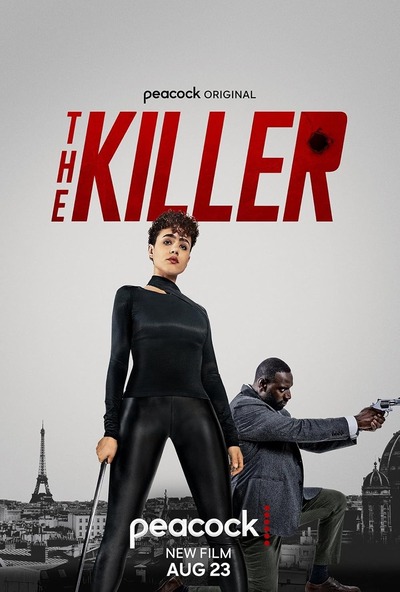 Back in 1990, I saw the original version of The Killer at the ICA in London. I’d never seen anything like it, and didn’t quite know what to think. But it kindled a deep fondness for Hong Kong cinema, and it’s also likely one of the most influential action films of the decade, whose impact is still being felt today. I wasn’t sure what to think about a remake, especially a gender-swapped one. These rarely work – hello, Ghostbusters. But at least this one was going to be done by the original director. Especially after having enjoyed his
Back in 1990, I saw the original version of The Killer at the ICA in London. I’d never seen anything like it, and didn’t quite know what to think. But it kindled a deep fondness for Hong Kong cinema, and it’s also likely one of the most influential action films of the decade, whose impact is still being felt today. I wasn’t sure what to think about a remake, especially a gender-swapped one. These rarely work – hello, Ghostbusters. But at least this one was going to be done by the original director. Especially after having enjoyed his 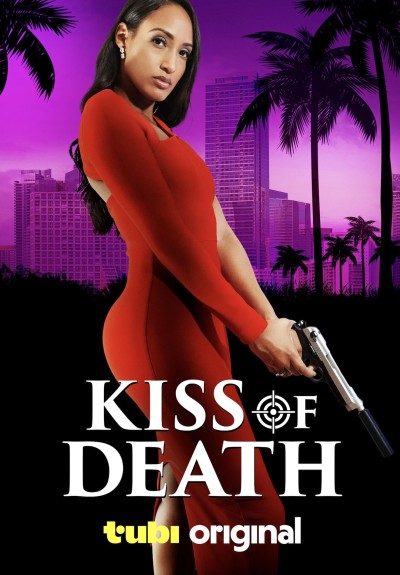 The relationship between Mykah (Leason) and Jameson (Chandler) is quickly heading for the rocks, as the honesty between them has evaporated. He suspects her of lying to him and having an affair: and he’s half-right. For Mykah is misleading him about the reason for her odd hours, though it is work-related as she claims. It’s just that her job is as an assassin, who kills the husbands of battered women, assisted by family friend Lady (Frazier). After successfully offing a prospective politician, Mykah’s next job is Dyson (Jackson), after his wife Chantelle tearfully tells her story of abuse, and offers to pay half a million dollars for a job well done.
The relationship between Mykah (Leason) and Jameson (Chandler) is quickly heading for the rocks, as the honesty between them has evaporated. He suspects her of lying to him and having an affair: and he’s half-right. For Mykah is misleading him about the reason for her odd hours, though it is work-related as she claims. It’s just that her job is as an assassin, who kills the husbands of battered women, assisted by family friend Lady (Frazier). After successfully offing a prospective politician, Mykah’s next job is Dyson (Jackson), after his wife Chantelle tearfully tells her story of abuse, and offers to pay half a million dollars for a job well done. 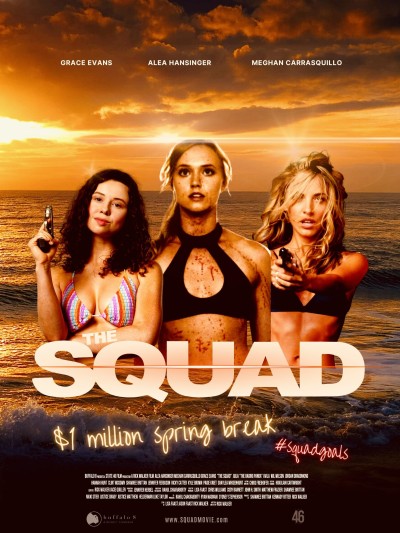 I was braced for this to be terrible, based on IMDb user comments which were either scathing, or came from accounts with one review – a sure sign they were astroturfed. On that basis, I guess I was pleasantly surprised. Don’t get me wrong: it’s not great, and only occasionally brushes against good. But it’s semi-competent, at least once the director calms the hell down, and stops giving us musical montages in lieu of content. The titular trio are
I was braced for this to be terrible, based on IMDb user comments which were either scathing, or came from accounts with one review – a sure sign they were astroturfed. On that basis, I guess I was pleasantly surprised. Don’t get me wrong: it’s not great, and only occasionally brushes against good. But it’s semi-competent, at least once the director calms the hell down, and stops giving us musical montages in lieu of content. The titular trio are 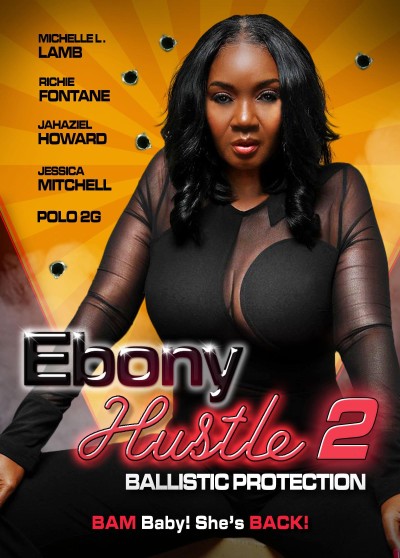 There are times when I end up asking myself deep philosophical questions, like “Why am I doing this?” or “Isn’t there something else on which I can use my time?” In this case it, was “Who thought a sequel to the painful exercise which was
There are times when I end up asking myself deep philosophical questions, like “Why am I doing this?” or “Isn’t there something else on which I can use my time?” In this case it, was “Who thought a sequel to the painful exercise which was 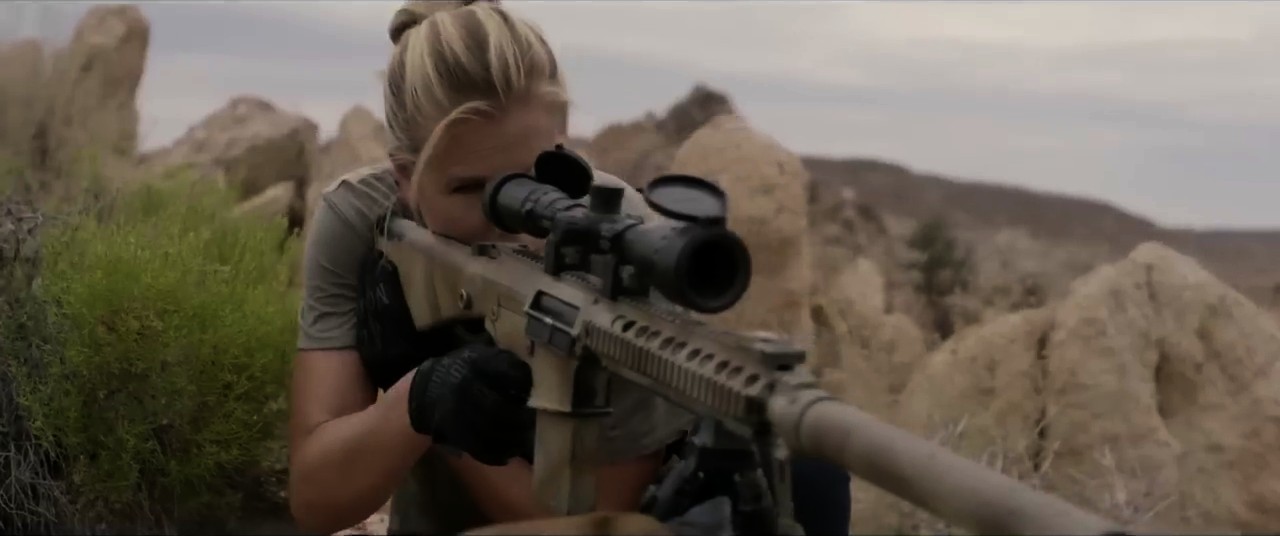 ★★
★★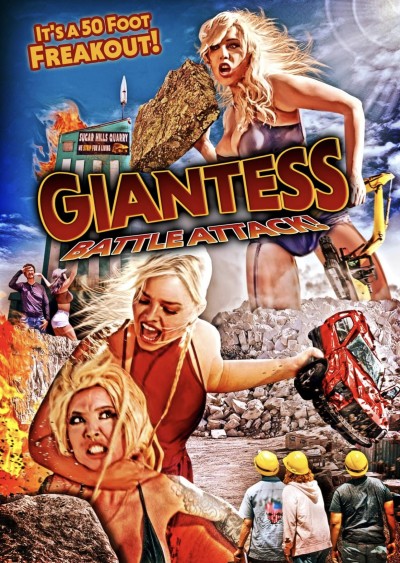 I was expecting this to be a follow-up to the previous Giantess films, most recently
I was expecting this to be a follow-up to the previous Giantess films, most recently 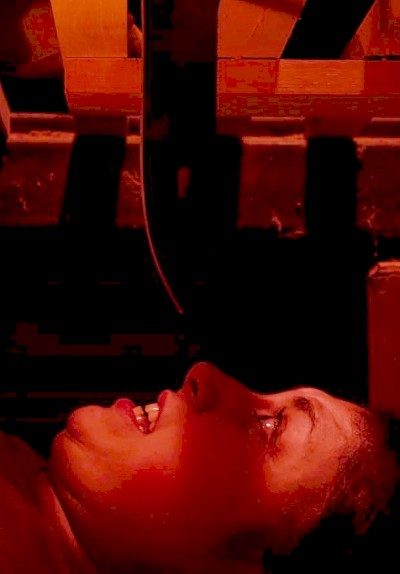 This is fairly sparse, unfolding entirely in the single location of a furniture factory, over the course of a single night. The central character is Karen (Terrazzino), a single mother who has just taken on the job of a cleaner and overnight security guard at the premises, in order to provide for her young daughter, who is ill on the night Karen has to start work. These issues quickly pale into insignificance – though not irrelevance – when a group of masked men enter the building, looking to hunt down and kill her. With the doors chained from the outside and the phone lines cut, Karen is entirely on her own against the bigger and stronger, but fortunately not smarter, intruders.
This is fairly sparse, unfolding entirely in the single location of a furniture factory, over the course of a single night. The central character is Karen (Terrazzino), a single mother who has just taken on the job of a cleaner and overnight security guard at the premises, in order to provide for her young daughter, who is ill on the night Karen has to start work. These issues quickly pale into insignificance – though not irrelevance – when a group of masked men enter the building, looking to hunt down and kill her. With the doors chained from the outside and the phone lines cut, Karen is entirely on her own against the bigger and stronger, but fortunately not smarter, intruders.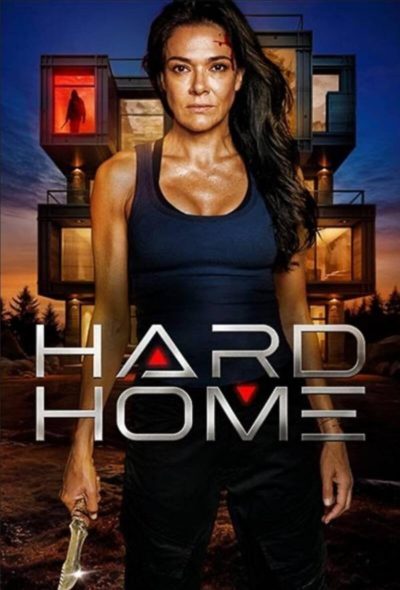 Mary (Kessell) has a grudge, and probably with good reason, I’d say. Because the serial killer known as Diablo killed her daughter, Kelly, in a particularly brutal manner – finishing his victim off by burning her alive. With the help of information provided by FBI Agent Selena Wall (Adedeji), Mary puts the pieces of the case together, and eventually lures Diablo (Howard) into attacking her, then brings him back to her house. This has been turned into a hi-tech, maze-like warren designed to force Diablo to confront all his crimes, and in particular his murder of Kelly. Naturally, things don’t quite go as intended. Expecting rational, predictable behaviour from a serial killer was probably a mistake by Mary, despite her technological advantages.
Mary (Kessell) has a grudge, and probably with good reason, I’d say. Because the serial killer known as Diablo killed her daughter, Kelly, in a particularly brutal manner – finishing his victim off by burning her alive. With the help of information provided by FBI Agent Selena Wall (Adedeji), Mary puts the pieces of the case together, and eventually lures Diablo (Howard) into attacking her, then brings him back to her house. This has been turned into a hi-tech, maze-like warren designed to force Diablo to confront all his crimes, and in particular his murder of Kelly. Naturally, things don’t quite go as intended. Expecting rational, predictable behaviour from a serial killer was probably a mistake by Mary, despite her technological advantages.